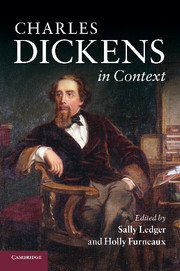Book contents
- Frontmatter
- Contents
- List of illustrations
- Notes on contributors
- Preface
- Notes on references
- PART I LIFE AND AFTERLIFE
- PART II SOCIAL AND CULTURAL CONTEXTS
- 12 Popular culture
- 13 The rise of celebrity culture
- 14 The newspaper and periodical market
- 15 Authorship and the professional writer
- 16 The theatre
- 17 Melodrama
- 18 The Bildungsroman
- 19 Visual culture
- 20 The historical novel
- 21 The illustrated novel
- 22 Christmas
- 23 Childhood
- 24 Work
- 25 Europe
- 26 The Victorians and America
- 27 Educating the Victorians
- 28 London
- 29 Politics
- 30 Political economy
- 31 The aristocracy
- 32 The middle classes
- 33 Urban migration and mobility
- 34 Financial markets and the banking system
- 35 Empires and colonies
- 36 Race
- 37 Crime
- 38 The law
- 39 Religion
- 40 Science
- 41 Transport
- 42 Illness, disease and social hygiene
- 43 Domesticity
- 44 Sexuality
- 45 Gender identities
- Further reading
- Index
31 - The aristocracy
Published online by Cambridge University Press: 05 August 2012
- Frontmatter
- Contents
- List of illustrations
- Notes on contributors
- Preface
- Notes on references
- PART I LIFE AND AFTERLIFE
- PART II SOCIAL AND CULTURAL CONTEXTS
- 12 Popular culture
- 13 The rise of celebrity culture
- 14 The newspaper and periodical market
- 15 Authorship and the professional writer
- 16 The theatre
- 17 Melodrama
- 18 The Bildungsroman
- 19 Visual culture
- 20 The historical novel
- 21 The illustrated novel
- 22 Christmas
- 23 Childhood
- 24 Work
- 25 Europe
- 26 The Victorians and America
- 27 Educating the Victorians
- 28 London
- 29 Politics
- 30 Political economy
- 31 The aristocracy
- 32 The middle classes
- 33 Urban migration and mobility
- 34 Financial markets and the banking system
- 35 Empires and colonies
- 36 Race
- 37 Crime
- 38 The law
- 39 Religion
- 40 Science
- 41 Transport
- 42 Illness, disease and social hygiene
- 43 Domesticity
- 44 Sexuality
- 45 Gender identities
- Further reading
- Index
Summary
The representation of the ethics of the ancien régime aristocracy in A Tale of Two Cities seems to suggest that Dickens conceived of the noblesse as behaving as if they were a class of despots whose power and opinions had remained unchallenged since the Dark Ages. When Charles Darnay tells his uncle, the Marquis St Evrémonde, that their family name is ‘more detested than any name in France’, the marquis responds by asserting that ‘detestation of the high is the involuntary homage of the low’ (book 2, ch. 9). A Tale of Two Cities is Dickens's most overt statement of his dislike of aristocratic privilege. The novel contains a graphic account of what Oscar Wilde's Lady Bracknell would later describe as ‘the worst excesses of the French Revolution’, and Dickens appears to root those ‘excesses’ in the misuse of power, both royal and aristocratic, under the ancien régime. ‘Crush humanity out of shape once more, under similar hammers’, his narrator comments, ‘and it will twist itself into the same tortured forms’ (book 3, ch. 15). Dickens doubtless considered this idea to be received wisdom, though it was one that, for him, had been persuasively rearticulated in Thomas Carlyle's highly influential The French Revolution.
- Type
- Chapter
- Information
- Charles Dickens in Context , pp. 252 - 259Publisher: Cambridge University PressPrint publication year: 2011
- 1
- Cited by



